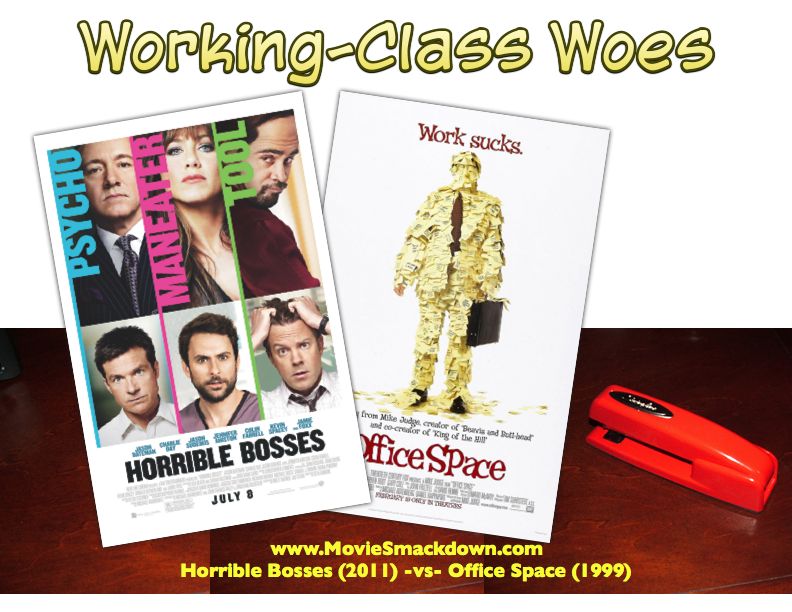
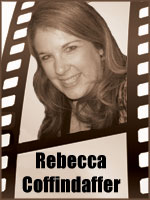 The Smackdown
The Smackdown
We love to watch glamorous Hollywood people be glamorous. More than that, we love to watch glamorous Hollywood people pretend to be Just Like Us and satirize the humdrum jobs the majority of Americans — at least, those of us lucky enough to be employed — are stuck with.
That’s the reason workplace comedies go over so well: They’re accessible and relatable, and God, don’t we all need a good laugh to get through the work week now and again. It’s a time-honored tradition from The Apartment to 9 to 5, and it even includes Dilbert and The Office, for those whose tastes run toward comic strips and TV.
When these satirized workers, over-burdened with indignities, finally snap, we get an offshoot of the office comedy — the Everyman-gets-his-revenge line, which serves up a satisfying order of comeuppance along with the laughs. Mike Judge’s Office Space typifies this subgenre, looking to prove there are still plenty of laughs to be milked from the rebellion of the American cubicle jockey. Now Horrible Bosses takes the ring against it with an impressive opening weekend at the box office.
But which one gets the promotion and which one gets Smack-downsized?
[singlepic id=1051 w=320 h=240 float=right]
The Challenger
A new generation is entering the workforce, having been taught to “find something that makes you happy†and “work at a job that matters.†Those platitudes are all very well and good, as Horrible Bosses points out, but a job is still a job, and we still have to deal with the same kind of crap.
Nick (Jason Bateman), Kurt (Jason Sudeikis) and Dale (Charlie Day) are long-time friends who all have their own work issues plaguing them. Nick is an office drone busting his butt for his manipulative psycho boss, Dave (Kevin Spacey), who has promised him that all his long hours and sacrifice will pay off with a promotion. Kurt is the accountant at a chemical company run by a wonderful man (Donald Sutherland), who just happens to have a horrible, cokehead son (an almost unrecognizable Colin Farrell). Dale is a dental assistant, engaged to a sweet lady even while he is blatantly and constantly sexually harassed by Dr. Julia, D.D.S. (Jennifer Aniston).
When all of their situations quickly go from bad to really freaking awful, they realize it’s their bosses who are making their lives beyond terrible, and they hatch a plan to kill them all.
[singlepic id=1050 w=320 h=240 float=right]
The Defending Champion
Not many people saw Office Space when it was first released in theaters in 1999, but that’s no longer the case. The film has become a cult classic for anyone who has ever worked a painfully dull and/or irritating job, and its after-market sales and rentals have been impressive.
Ron Livingston (Dinner for Schmucks) stars as Peter Gibbons, a smart guy working for a software company that is slowly crushing his soul. Stuck in a cubicle, burdened with mundane tasks and coversheets for his engineering reports, he vents to his two coworker buddies (David Herman and Ajay Naidu), nurses a crush on waitress Joanna (Jennifer Aniston again), and tries to avoid his most irritating boss (Gary Cole). After a bout with an occupational hypnotherapist that puts his life into perspective, he begins to rebel against Corporate America.
The Scorecard
On the surface, Horrible Bosses and Office Space are woven from the same cloth: Three buddies get back at their jobs. Satire flows like gold in El Dorado. Heck, they even both have Jennifer Aniston. But the films have key differences. Office Space is mostly about Livingston’s character Peter, and the actor has never been showcased better than in the post-hypnosis montage when he decides to give his job absolutely nothing anymore and instead do whatever he wants. That wonderful, calm smile on his face while he takes apart his cubicle walls tells us something deep about the frustration of the American worker. It’s equal parts despair, glee and acceptance in turn.
Horrible Bosses, on the other hand, gives even weight to all three leading men and then stands back and lets them do the comedy they do best. Bateman, Sudeikis and Day bring different strengths to the table – Bateman’s exasperated sarcasm and impeccable timing, Sudeikis’ eye-winking snark, Day’s frenetic and fast-talking neuroses. They should clash when thrown all together, but instead, thanks to their chemistry, Seth Gordon’s direction and the script by Michael Markowitz, John Francis Daley and Jonathan Goldstein, they meld seamlessly and solidify the impression that these guys really have been friends for years.
For a supporting cast, Office Space gives us a variety of memorable caricatures – not really people so much as cartoons inhabiting this environment. Stephen Root’s Milton, a character actually first created in a Mike Judge cartoon, is the most obvious – a mumbling, awkward, mentally unstable officemate with an unhealthy attachment to his bright red stapler. John C. McGinley rocks a solid mustache and steals some great scenes as one of two efficiency experts named Bob. Diedrich Bader turns up as Peter’s mulleted next door neighbor, a shocking, albeit crass voice of reason.-And Gary Cole, as Peter’s monotone boss Bill Lumbergh, pulls off a fantastically dull (and yet, evil) nemesis that is all-too-familiar in the white collar world.
Horrible Bosses doesn’t skimp on supporting cast either. Most of its big name players are cast as the bosses, and these screen veterans know how to milk every minute of camera time. Spacey’s pure egomaniacal evil would be almost excessive if it weren’t so much fun. Farrell obviously enjoys getting to put on a bad comb-over and really atrocious costuming and run around being as douchey as possible. Even better is Jamie Foxx in full-on thug attire, oozing through shadows as a recently released convict who offers advice on how to get away with murder in exchange for some quick cash.
The differences between these films lie between their overall tones, how they approach their satire and what its goal is. Office Space prioritizes social commentary above all else. The tone is calmer, the plot less linear and more a series of sketches. It’s not about the characters so much as the ridiculous nature of cube farms and what it means to be happy in life.
Horrible Bosses, on the other hand, is amped up. The setup is a bit slow, but once it hits its stride, it keeps running and challenges the audience to keep up. You’re there to hang out with Bateman and Sudeikis and Day and listen to them play rapid-fire dialogue off of each other and root for them to get their revenge. It mocks a lot of social elements, but it’s much more of a situational black comedy than anything else. How far would you go? Where would you draw the line?
The Decision
Horrible Bosses was a much better movie than expected, thanks to its direction, the script and some great performances. Meanwhile, Office Space is and always will be a classic – a look at what it’s like to get fed up with being just another worker bee in a hive society. That slow-motion destruction of a printer will live forever in film infamy.
Unlike Kevin Spacey, I am not a tyrannical employer, and when a cast works that hard to make a film fall-out-of-your-seat funny, they get the promotion they deserve. It seems almost sacrilegious, but I give the win to Horrible Bosses – by the length of a paperclip.

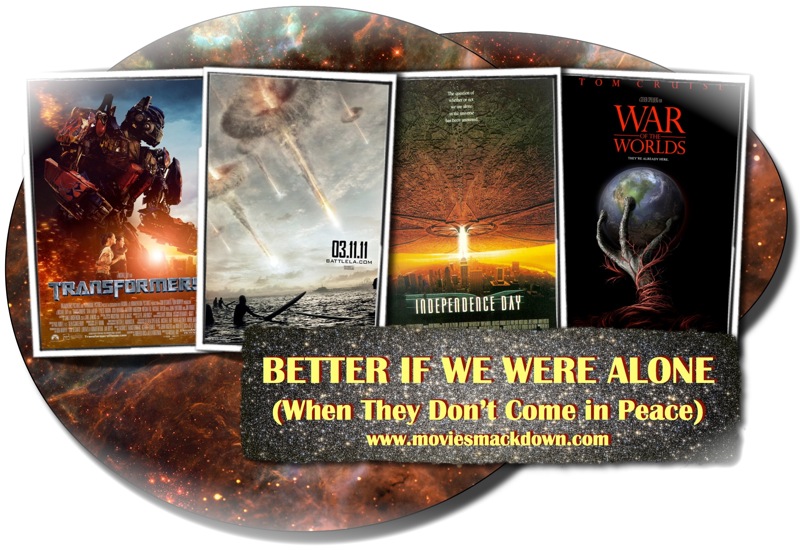
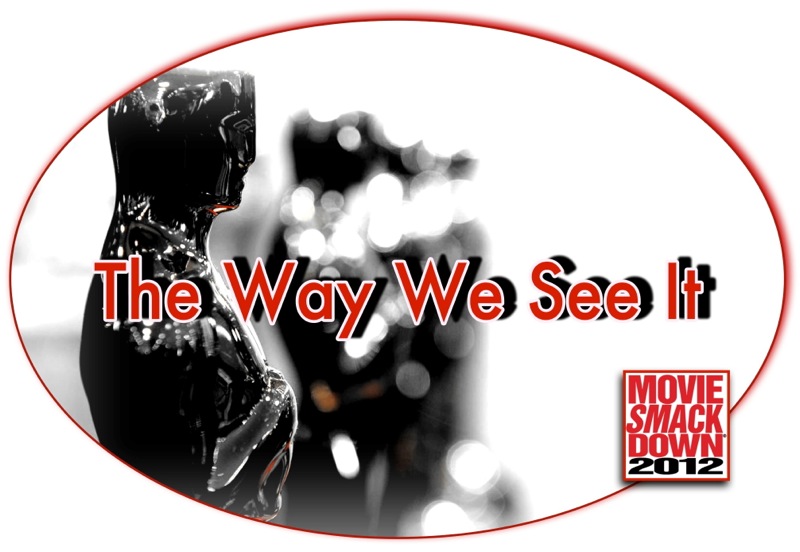
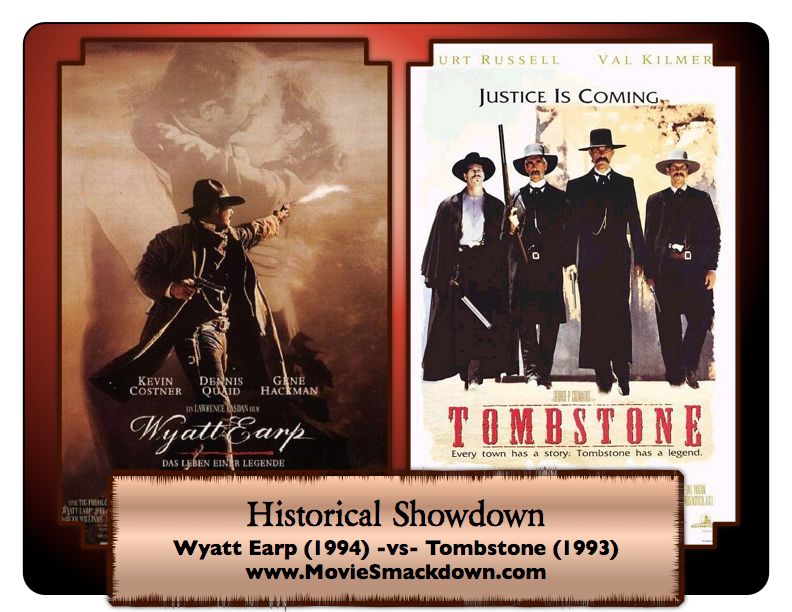
I thought both movies were awesome. But to tell you the truth, the bosses in Horrible Bosses, (especially Kevin Spacey) make Bill Lumberg look like the kind of Boss you WANT to work for.
Just saw this in our local theater. Rainn Wilson was in the audience, too. That’s the LA experience!
Crowd seemed to enjoy the film a lot (including Rainn). I sure did.
All you have to do is get over the obvious; that the solution to their problems is not murder but getting another job. But the relationships and the situations were very funny.